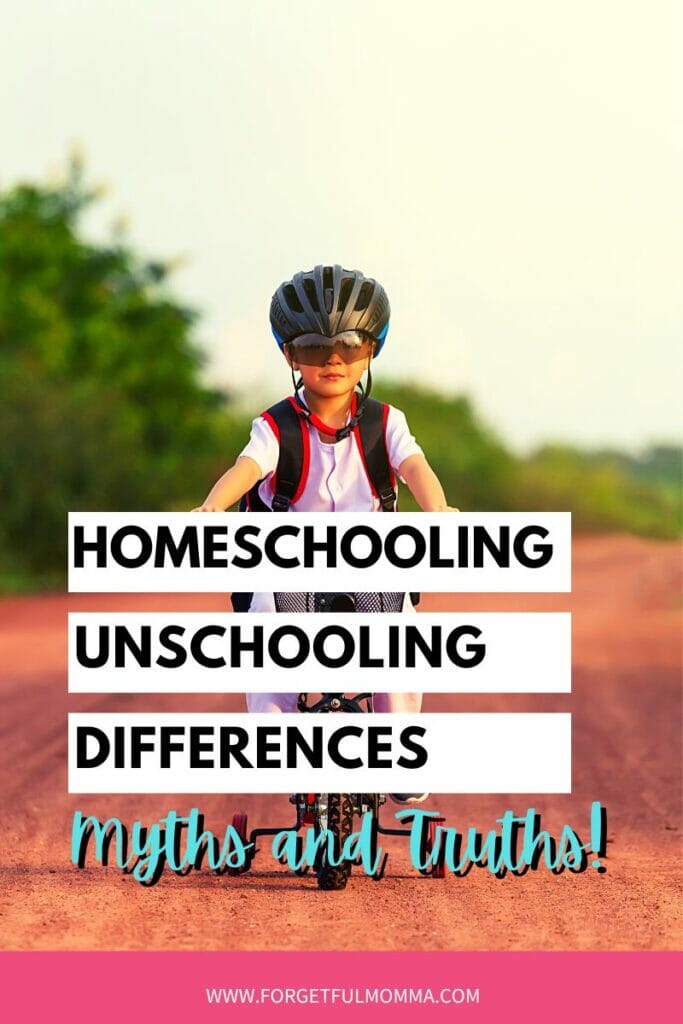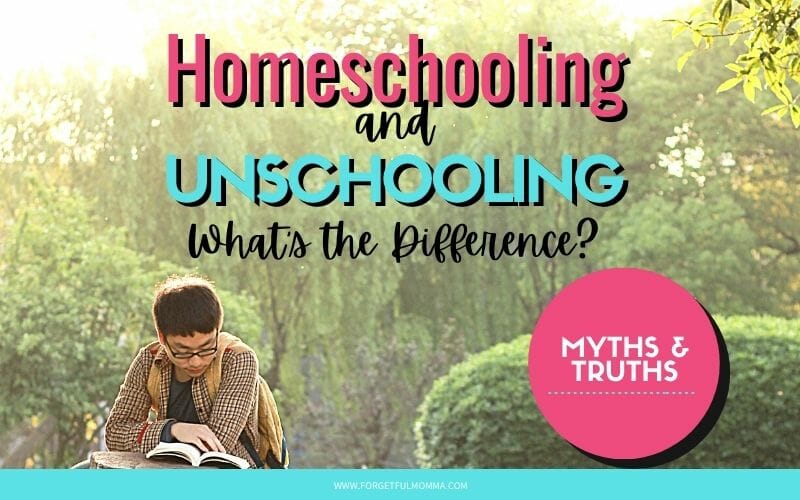What is the difference and are you really teaching your kids if you are unschooling? Let’s talk about it. Personally, I love what unschooling has to offer when you do it right. Kids are learning machines, let’s provide the material and let them learn at their pace. So, what is the difference between homeschooling and unschooling?

This post contains affiliate links, see my disclosure policy for more information.
Homeschooling and Unschooling
Many people get confused over the terms “homeschooling” and “unschooling.” For many, the concept of unschooling is new in itself. Here are some of the differences and similarities between homeschooling and unschooling, both of which are forms of alternative education.
Homeschooling in the Traditional Sense
When a family decides to homeschool their child or children, they usually go through a certain preparation. This may include such steps as:
- Finding out the local educational laws and regulations in their area
- Setting up a special area or room in the house for educational purposes
- Deciding on a specific curriculum or aspects of various curricula
- Determining their student’s reading level
- Determining their student’s learning style (visual, auditory, tactile, etc.)
Unschooling
When a family decides to unschool, there are different types of preparation that may or may not occur. Some preparatory steps are similar. Unschoolers also need to become familiar with their local laws and regulations regarding education.
They also may or may not do the following:
- Determine their student’s learning style
- Gather books and materials that further their student’s interests
- Familiarize themselves with their local library and other resources so they can have these available when their child has a learning “moment” and expresses interest in a subject or subjects
Perhaps the most fundamental difference between homeschoolers and unschoolers is that unschooling is child-led, whereas homeschooling may or may not be child-led, or may be partially child-led.
Unschoolers do not choose a specific curriculum, nor do they have their student do worksheets regularly and take tests.
Homeschool Myths
There are some myths and misconceptions about homeschooling and unschooling. Here are some of the myths, followed by the facts.
Myth: Unschoolers neglect their children’s education.
Truth: On the contrary – unschooling is participatory and active. It requires the parent/teacher to be a keen observer of his or her child, and always be available for seizing a learning moment.
An unschooling parent cannot “tune out”! Unschooled children still learn the essential core subjects such as reading, handwriting, social studies, and so forth, just not by force out of a textbook.
Myth: Homeschoolers are “un-socialized.”
Truth: Homeschooled children may avoid the social dynamics of an educational institution, but that does not make them “un-socialized.” In fact, homeschooled kids are out in the world, interacting with a variety of people, while institutionally educated kids see the same teacher and fellow students every day in the same room.
Homeschooled kids still participate in community activities such as homeschool groups and Scouts, all those extra-curricular activities that are out there.

Myth: Unschooling parents are lazy.
Truth: As noted above, unschooling is anything but lazy. Unschooling requires a lot of active observation and participation, and a willingness to go the extra mile to help the student learn a subject thoroughly. And many, many trips to the library or bookstore to grab materials that your kids are interested in learning about.
Myth: Homeschooled kids do not succeed in higher education.
Truth: Homeschooled kids are actually sought after as recipients of scholarships to various universities and colleges. High educational institutions recognize the discipline and character that is usually a component of homeschooling, and graduates of a home school actually have an edge.
Do you unschool or are interested in unschooling? I hope this helped you learn more about the unschooling style of homeschooling. It can take time to readjust your way of thinking about school.
More Homeschooling
How to Plan Your Homeschool – Unschooling or Eclectic
